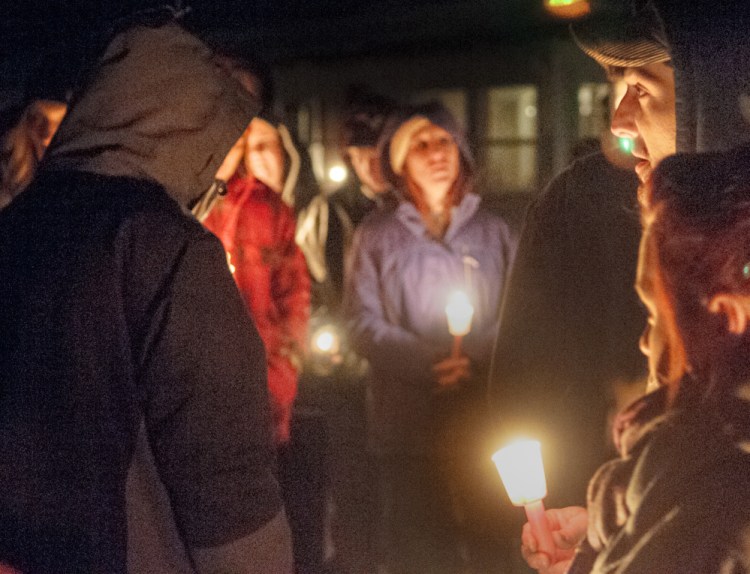AUGUSTA — Devastated by the loss of their younger son in an execution-style killing on Christmas Day 2015, Eric Williams’ parents sought $4,936 from the state Victims’ Compensation Program for funeral and burial costs, plus funds for counseling for themselves and their older son.
They got denied.
The board members sent their condolences, but they said the law prevents them from paying for those things because Williams committed criminal conduct — authorities say he had burglarized an apartment hours earlier — that led to his death.
Williams’ parents disagree with the board’s decision, saying while others may have accused their son of burglarizing the apartment of David Marble Jr.— the man accused in the double homicide — Williams should be regarded as innocent until proven guilty.
They have appealed the denial — only the third such appeal in the last 20 years — to the superior court and want a judge to overturn that decision.
A hearing is scheduled for Sept. 6 at the Capital Judicial Center in Augusta. The Williamses say the board has more information about the murders and what led to them than what has been shared with them and with the public.
They did not return two phone messages this week about the appeals case.
According to Debra Rice, director of the state Victims’ Compensation Program, only two other claimants have appealed denials to the superior court over the past 20 years.
In an email sent Friday, Rice said, “We have received just shy of 5,000 cases over the life of the Victims’ Compensation Program. That averages about 215 cases per year. For the last state Fiscal Year, 25 cases were denied, of which eight were denied for criminal conduct.”
Eric Williams, 35, was killed just after 3:30 a.m. Dec. 25, 2015, by a single gunshot to the head as he sat in his Chevrolet Trailblazer on Sanford Road in a rural area of Manchester not far from his Augusta home. The woman in his vehicle with him, Bonnie Royer, 26, of Augusta was shot in the head and neck and killed as well. She lived long enough to call 911 on Eric Williams’ cellphone and tell a dispatcher she had been shot.
Her family received assistance from the victim’s compensation program. She was not among those believed to be involved in the burglary.
Marble, now 31, has pleaded not guilty to the two charges of intentional and knowing murder as well as possession of a firearm by a prohibited person, and the case has been transferred to Cumberland County, where the next hearing is scheduled for February 2018.
BURGLARY QUESTIONS
Investigators have said the killings were revenge for the burglary.
The Williamses’ appeals brief filed last month with the court says, “The degree of Eric’s involvement that night will never be known because Eric was silenced and not here to defend himself and account for the activities that evening and early morning. In fact, Eric was asked by Shane Morrow that night if he broke into the apartment and he responded, ‘No.'”
They also say, “Eric was deemed guilty until proven innocent, based on the accounts of interviews with folks that had everything to gain and nothing to lose, blame it on the murdered person, that’s easy.”
The Williamses ask questions as well.
“If someone broke into another person’s place, why would they ever go and meet them down a dark, dirt road?”
They ask the court to reverse the decision of the Victims’ Compensation Board and approve compensation for the family.
“In addition, if this honorable court is made privy to the information the family believes the Board has, then we will abide by the ruling and not continue to burden the court, but ask the Board’s acknowledgment that the decision was made outside of the affidavit.”
A 12-page affidavit by Maine State Police Detective Christopher A. Tremblay, filed in support of an arrest warrant for Marble, indicates that he believed Williams had burglarized his apartment just two hours earlier while Marble was being driven to the Portland area on a drug run.
Tremblay says Williams, two other men and a woman — not Royer — burglarized Marble’s Sewall Street apartment between 12:30 and 1:15 a.m. Dec. 25, stealing televisions, backpacks, a gun and drugs. It says they did so after learning that Marble was being driven to Westbrook, meaning the drug or “stash” house would be unoccupied.
It also says Marble called Williams to say he had been “cleaned out.”
Other people, including an unnamed informant, told police that Williams had been working for Marble. They said Williams, nicknamed “Chunkie,” was to collect Marble’s money from another drug dealer nicknamed “2Tall” on Dec. 23, 2015, but failed to return with the money to Marble’s apartment.
It also says Marble arranged to buy two handguns, including a 9 mm Smith and Wesson, that same day, paying cash for the firearms and giving heroin to the people who went to get them for him. It says a Sig Sauer had been bought for Marble a day earlier as well under the same arrangement.
An item on Marble’s Facebook page from Dec. 28, 2015, which was cited in the affidavit, says, “Forgive me GOD FOR I HAVE SIN. Spiritus Sancti.”
The affidavit also says Marble denied he had anything to do with their deaths when he was questioned by Williams and Royer’s friends on Christmas Day.
VOTE TO DENY
In asking the superior court to uphold the Victims’ Compensation Board’s decision, Assistant Attorney General Thomas Knowlton succeeded in getting got the agency’s record sealed in the case, noting in a court filing that “portions of the agency record … contain intelligence and investigative record information related to a pending murder prosecution … and such information is made confidential by (state law).”
His brief describes the case, noting that Marble, also known as “Dee Money,” “was involved in illegal drug activity in Maine during 2015, and Eric Williams had been running drugs and money for Marble.”
It says that “in the very early morning hours of Dec. 25, 2015, Eric and others drove to Marble’s apartment on Sewall Street in Augusta, Maine,” knowing Marble was in Westbrook. It says the group took drugs, a firearm, a backpack and televisions and that Eric kept some drugs and the stolen firearm.
In a footnote, Knowlton notes, “Bonnie was a friend of Eric’s. The evidence before the Board did not suggest that Bonnie entered Marble’s residence, or that she was outside the residence in a vehicle when Eric and two others burglarized Marble’s residence on Dec. 25, 2015.”
His brief says, “Due to the pending criminal prosecution of Marble and out of concern for the Williams family, the Board kept the details of the underlying criminal conduct out of its final decision. However, the Board’s findings that Eric violated a criminal law (burglary and/or theft) on Dec. 25, 2015, and that this violation caused or contributed to Marble’s murder of Eric a few hours later were well supported by the record.”
Knowlton outlines the case noting the Williams family applied for the compensation Feb. 12, 2016, and the Board sought information from law enforcement officials about Eric Williams’ death.
It issued a preliminary denial July 14, 2016, and the Williams family asked for a hearing, which was held Oct. 13, 2016.
“In early 2017, the Board received additional information from law enforcement regarding the circumstances surrounding Eric’s murder,” Knowlton says, and then the Board voted unanimously to deny the application.
“The Board found that ‘a preponderance of the evidence supports a finding that Eric Williams violated a criminal law’ and that ‘this violation caused or contributed to Eric’s murder.”
He says that conclusion is “well supported by the record.”
State law says, “Compensation may not be paid … to or on behalf of any person who violated a criminal law that caused or contributed to the injury or death for which compensation is sought.”
In a footnote, Knowlton says, “The Board was unable to share this information with petitioners due to the pending criminal prosecution of Marble.”
He also notes that it appears there are no Law Court decisions in Maine regarding the statute that bars compensation awards in cases where people are found to have violated a law that caused or led to their injury or death.
The fund is supported by surcharges on people convicted of crimes. In state court, the fee is $35 for crimes of murder and felonies and $20 for misdemeanors. However, there are substantially higher assessments for people involved in sex trafficking.
In her email, Rice said federal defendants also contribute, and some criminals are ordered to pay restitution to the fund.
For the state fiscal year 2017, she said, the fund received $1.1 million and paid out more than $578,000 “to or for the benefit of crime victims.”
The Victims’ Compensation Board has three members, all appointed by the state attorney general. One must be a physician, one an attorney and one familiar with dealing with victims of crimes. Those roles are currently filled by Dr. Andrew Dionne, attorney Margot Joly and the victim services representative, Denise Marr.
Betty Adams — 621-5631
Twitter: @betadams
Send questions/comments to the editors.






